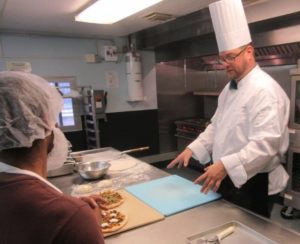Grilled rib eye with mushroom demi-glace. Caramelized lime salmon. Mixed berry English trifle.
These are not exactly menu items that one might imagine when talking about prison fare.

But these dishes were among those prepared by inmates and served at graduation for recent classes at the Pennsylvania Department of Corrections Culinary Arts Program in Elizabethtown, one of three food service training programs in the statewide prison system.
Since the first formal DOC culinary program in 2003, hundreds of inmates have graduated with basic kitchen skills and the valuable ServSafe certificate in hand.
Today the culinary academy programs range from nine to 36 weeks. The original program started at the DOC Training Academy in Elizabethtown, a second program for men is held at SCI Waymart in the northeast and the first formal program for female inmates started last year at SCI Muncy, northeast of Williamsport. All the programs focus on developing the skills needed to leave prison prepared for a job in the high-demand food service industry.

“The culinary arts programs are among the many career-training programs within DOC that provide valuable skills that lead to employment upon release,” said Corrections Secretary John Wetzel. “Almost all of the individuals incarcerated in our prisons will return to the community one day and employment is key to ensuring they are successful and do not return to prison.”
Culinary students study techniques in bread baking, cake baking and decorating, knife skills, and basic preparation skills for soups, starches, vegetables, and proteins. Training Academy students prepare gourmet three-course meals served for “Restaurant Days” held every nine weeks and all programs prepare a graduation buffet to celebrate the conclusion of the courses.
Through its Pathways to Success program, the DOC is working to better tailor programs for high demand industries; food service is one of them.
Efforts are under way to raise the profile of the culinary academies through media outreach and public programming, including demonstrations at the Eastern State Penitentiary historic site’s Prison Food Weekend and, for the second year, with DOC participation in the PA Preferred Culinary Connections stage at the Pennsylvania Farm Show.

Instructor chef Todd Lewis, who oversees the Training Academy program, and the other instructors have decades of experience in the food service industry. Lewis, a graduate of Johnson & Wales University in Rhode Island, has worked for a number of hotels and restaurants, as well as Disney resorts during his 30-year career.
SCI Muncy academy instructor Robert Weaver has spent 24 years with the Department of Corrections and formerly supervised Muncy’s kitchen staff. Chef James Mitchell, who was named restaurant trades instructor at SCI Waymart in 2007, previously worked at restaurants on the east coast, including a five-star restaurant in Boston.
In order to qualify for entry into the culinary programs, inmates must be within three years of release to ensure the ServSafe certificate is still valid when they return to the community. Applicants also must have a high school diploma or GED, previous experience—or strong interest—in food service, be free of disciplinary issues for one year and have completed all other required programming for their release.
“You can take a restaurant trades class some places and never work in a kitchen,” said Terri Fazio, the DOC’s director of the Bureau of Correction Education. “Our programs are designed for students to receive book training and spend time in the kitchen getting hands on training.”

In addition to ServSafe, some students also complete the National Occupation Competency Testing Institute (NOCTI) in restaurant trades. Reentry specialists in the DOC stress the importance of training as the key to stable employment, which means less chance of recidivism.
“A good percentage of inmates want a job where they can support their families and earn a life-sustaining wage,” said Fazio. “In addition to the culinary training, we help them develop soft job skills, like interviewing, workplace etiquette and resume preparation. Hopefully that’s the ticket to success. It’s the only way to break the cycle.“
DOC does not formally track inmates into the community to determine their success rate, but anecdotally the instructors say many graduates are able to quickly find work or are furthering their culinary education.
Building on the success of the existing programs, the state’s newest prison, SCI Phoenix, outside of Philadelphia, is currently set to open its culinary academy this spring. •
PRLA members are invited to join Chef Lewis and his culinary students for “Restaurant Day” held about once every three months at the DOC Training Academy in Elizabethtown. For more information contact Shane Hiner at 717-361-4321.











